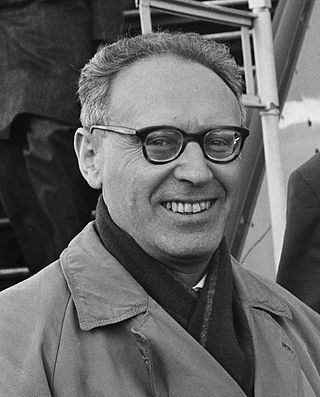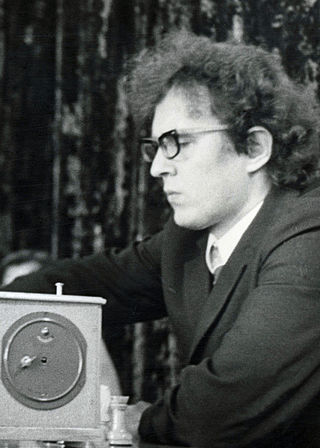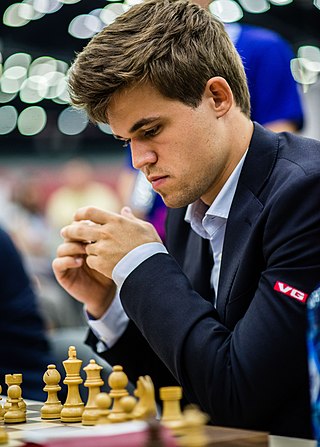
David Ionovich Bronstein was a Soviet chess player. Awarded the title of International Grandmaster by FIDE in 1950, he narrowly missed becoming World Chess Champion in 1951. Bronstein was one of the world's strongest players from the mid-1940s into the mid-1970s, and was described by his peers as a creative genius and master of tactics. He was also a renowned chess writer; his book Zurich International Chess Tournament 1953 is widely considered one of the greatest chess books ever written.

Mikhail Moiseyevich Botvinnik was a Soviet and Russian chess grandmaster who held five world titles in three different reigns. The sixth World Chess Champion, he also worked as an electrical engineer and computer scientist and was a pioneer in computer chess. He also had a mathematics degree(honorary).

Vasily Vasilyevich Smyslov was a Soviet and Russian chess grandmaster, who was World Chess Champion from 1957 to 1958. He was a Candidate for the World Chess Championship on eight occasions. Smyslov twice tied for first place at the USSR Chess Championships, and his total of 17 Chess Olympiad medals won is an all-time record. In five European Team Championships, Smyslov won ten gold medals.

The USSR Chess Championship was played from 1921 to 1991. Organized by the USSR Chess Federation, it was the strongest national chess championship ever held, with eight world chess champions and four world championship finalists among its winners. It was held as a round-robin tournament with the exception of the 35th and 58th championships, which were of the Swiss system.

Paul Keres was an Estonian chess grandmaster and chess writer. He was among the world's top players from the mid-1930s to the mid-1960s, and narrowly missed a chance at a World Chess Championship match on five occasions. As Estonia was repeatedly invaded and occupied during World War II, Keres was forced by the circumstances to represent the former Soviet Union and Nazi Germany (1941–44) in international tournaments.

Maia Chiburdanidze is a Georgian chess Grandmaster. She is the sixth Women's World Chess Champion, a title she held from 1978 to 1991, and was the youngest one until 2010, when this record was broken by Hou Yifan. Chiburdanidze is the second woman to be awarded the title of Grandmaster by FIDE, which took place in 1984. She has played on nine gold-medal-winning teams in the Women's Chess Olympiad.

Vitaly Valeryevich Tseshkovsky was a Russian chess Grandmaster and a former champion of the USSR.

Elisaveta Ivanovna Bykova was a Soviet chess player and twice Women's World Chess Champion, from 1953 until 1956, and again from 1958 to 1962. She was awarded the titles of Woman International Master in 1950, International Master in 1953, and Woman Grandmaster in 1976. In 2013, she was inducted into the World Chess Hall of Fame.

Oleg Mikhailovich Romanishin is a Ukrainian chess grandmaster and former European junior champion.

Tatiana Zatulovskaya was an Israeli chess player. She was three-time Soviet women's champion and twice world women's senior champion. She was awarded the titles Woman International Master (WIM) in 1961 and Woman Grandmaster (WGM) in 1976 by FIDE. Her last name may also be spelled as Zatulovskaia or Zatulovskaja.

Josif Davidovich Dorfman is a Soviet-French chess Grandmaster, coach, and chess writer.

Alla Shulimovna Kushnir was a Soviet-born Israeli chess player. She was awarded the FIDE titles of Woman International Master (WIM) in 1962 and Woman Grandmaster (WGM) in 1976. In 2017, she was inducted into the World Chess Hall of Fame.

Nana Alexandria is a Georgian chess player. A three-time Soviet women's champion, she was the challenger in two matches for the Women's World Chess Championship.
The first chess youth championship in Europe was the yearly European Junior Championship for under age 20. It was played from 1971–2002. FIDE officially introduced the European Junior Championship in 1970 at their Annual Congress and so the 1971/72 edition was the first official European Junior Championship. Effectively, they adopted the 'Niemeyer Tournament', held every year in Groningen since 1962, and re-packaged it. For completeness also the winners of this Niemeyer tournament are listed. The first competition for girls was held in 1977/1978.
The Women's Chess Olympiad is an event held by FIDE since 1957, where national women's teams compete at chess for gold, silver and bronze medals. Since 1976 the Women's Chess Olympiad has been incorporated within Chess Olympiad events, with simultaneous women's and open tournaments.

Boris Kreiman is an American Grandmaster of chess. Kreiman a 3rd-place winner in a U.S. Chess Championship in Seattle is also a winner of the Frank P. Samford, Jr. Chess Fellowship.

Viktor Lvovich Korchnoi was a Soviet and Swiss chess grandmaster (GM) and chess writer. He is considered one of the strongest players never to have become World Chess Champion.

FIDE titles are awarded by the international chess governing body FIDE for outstanding performance. The highest such title is Grandmaster (GM). Titles generally require a combination of Elo rating and norms. Once awarded, titles are held for life except in cases of fraud or cheating. Open titles may be earned by all players, while women's titles are restricted to female players. Many strong female players hold both open and women's titles. FIDE also awards titles for arbiters, organizers and trainers. Titles for correspondence chess, chess problem composition and chess problem solving are no longer administered by FIDE.
Gennadij Timoscenko, is a Russian and Slovak chess Grandmaster (GM) (1980).
Itchak Radashkovich is an Israeli chess International master (IM) (1976).
















